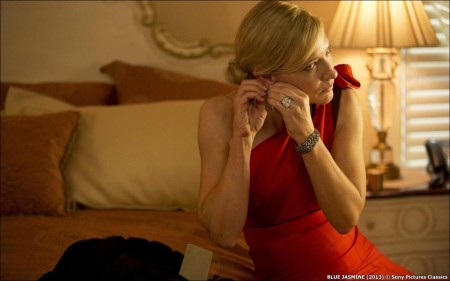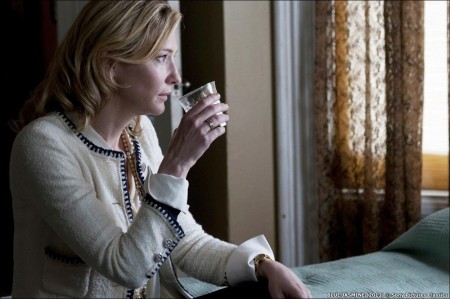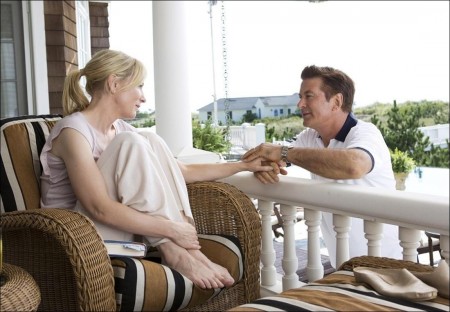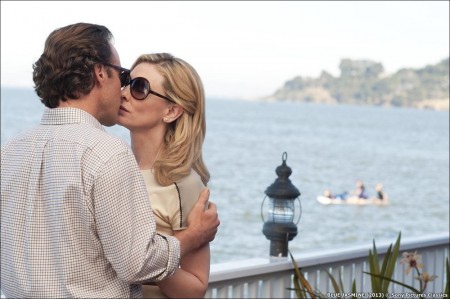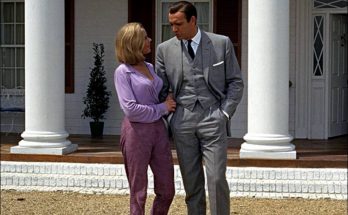Blue Jasmine: The final stages of a New York housewife. Hal and Jasmine Francis are a multimillionaire couple in New York living a life of mansions, yachts, and wealthy friends. They look down on Jasmine’s sister Ginger and her husband. When Hal wants a divorce because he is in love with another woman, Jasmine takes revenge and exposes smooth-talking Hal as a crooked financier. Hal goes to prison, where he hangs himself.
Danny, Hal’s son and story of Jasmine’s step-son, is very angry with Jasmine and does not want to have anything to do with her anymore. With nowhere else to go, Jasmine moves into Ginger’s lower middle-class apartment in San Francisco to try to pull herself back together again. Earlier Ginger and her ex-husband Augie allowed Hal to invest the lottery money they won, but he lost it all. Reluctantly, Jasmine accepts a job as a dentist’s secretary but her boss harasses her sexually and she quits. She wants to study interior decorating online and as a preparation reluctantly takes computer classes.
Jasmine’s life improves when she meets wealthy, upscale Dwight Westlake, who aspires to become a California congressman. He wants to marry Jasmine until Augie happens to meet them on the street and exposes her as a liar: about her former husband, her son and about being an interior decorator. Ginger begins to have doubts about her boyfriend Chili and has an affair with a man who turns out to be married so she ultimately reconciles with Chili. Jasmine is against this because she dislikes him, and lies to Ginger that she is going to marry Dwight, telling her she is not going to stay in her place any longer. The film ends with Jasmine sitting on a park bench, talking to herself again and not having a clue how to get on with her life.
Throughout his career, Woody Allen has created many indelible female characters portrayed by some of the world’s greatest actresses, including Diane Keaton, Geraldine Page, Mariel Hemingway, Charlotte Rampling, Mia Farrow, Barbara Hershey, Gena Rowlands, Dianne Wiest, Mira Sorvino, Judy Davis, Samantha Morton, and Scarlett Johansson, to mention only a few. Whether they appear in light comedies, dark dramas or anything in between, these complex female characters resonate in our memories as the focal points of his movies. Certain to take her place in this gallery of multifaceted, complex, and richly observed women is Jasmine, the troubled heroine of Allen’s new drama BLUE JASMINE, portrayed by another one of the world’s most extraordinary actresses, Cate Blanchett.
We first meet New York socialite Jasmine shortly after she has suffered a breakdown, triggered by the cataclysmic collapse of her marriage to wealthy financier Hal (Alec Baldwin). Up until that point Jasmine’s entire identity was wrapped up in being an elegant, well dressed, culturally sophisticated woman living the Manhattan high life, but now that life is over, and her mental and emotional state is rapidly veering off course. “We know from the minute the movie opens that Jasmine is lost,” says Allen. “She’s already someone who has been found talking to herself and has had real problems.”
Hitting rock bottom both financially and psychologically, and having nowhere else to go, Jasmine turns to her sister Ginger (Sally Hawkins), a grocery store cashier in San Francisco. “Jasmine has really been through the mill,” says Allen. “In a fit of anger she did something that caused dire consequences she never anticipated, and she brought on herself an extremely potent series of traumas.” Says Blanchett: “Jasmine is in freefall and has to leave behind everything she knows and has expected. She’s entering the realm of absolute unknown, moving from one coast to the other, from one social set to the other, one class to another.”
Hal, portrayed by Alec Baldwin, is a man whose fortune is as bountiful as the source of his income is questionable. “I think Hal is like a million guys out there, who have this big shot complex,” says Allen. “They make a lot of money and they’re charming and generous with people. They stay just within the law when they can, and when they have to stretch it a little, they stretch it.”
Hal is also equally flexible in his attitudes towards fidelity. “I think Hal is like a lot of hard-charging, successful men who feel the need to take the edge off of a stressful life and expect their wives to understand,” says Baldwin. “In his case Jasmine isn’t able to accept that, but he is very adept at reassuring her that she has nothing to worry about.” Says Allen: “For Hal, Jasmine is elegant and knows how to keep up the social end of things, and yet he’s always playing around because he’s good looking and dynamic and that’s his style.”
Born with the name Jeanette, Jasmine took on her more poetic moniker around the time Hal came into her life. “It’s quite a theatrical choice,” says Blanchett, “and it’s very telling that she didn’t call herself Scarlett or something completely different — she always steps slightly sideways from the truth. Small fantasies like this are harmless in of themselves, but the more you do it, the further you get away from reality.” Blanchett continues: “This leads to the question: ‘Is Jasmine predisposed to being a fantasist or is she a fantasist through circumstance?’ I think there’s a certain type of person who has a more fragile makeup and a less tangible grip on reality and Jasmine probably is in that camp.”
Arriving in San Francisco, Jasmine is dismayed to see Ginger’s modest apartment and lifestyle, so completely different than what she is accustomed to. Adding to her discomfort is the fact that her relationship with her sister has always been complicated. Jasmine and Ginger were adopted children from different parents, and from the beginning, Jasmine was the favored child, bathed in love, of which Ginger received very little. “Jasmine had this golden aura around her,” says Sally Hawkins (HAPPY-GO-LUCKY), who plays Ginger. “She was brighter and prettier and more elegant from birth. Ginger saw herself as the lesser child and the one who wasn’t really liked — sort of the runt of the litter.”
The impact of the different treatments they received as children created a degree of tension between the two of them early on as well as two very contrasting viewpoints of life. Jasmine grew up with a sense of entitlement and found Hal to give her the life she felt she deserved whereas Ginger had very modest expectations, but developed the robust strength and skills to make it on her own. Her approach to life was always more hands-on. She bartended and waited tables, married a rough-hewn handyman named Augie (Andrew Dice Clay) with whom she had two boys.
When Jasmine, on the other hand, was forced by circumstance to work in a fancy shoe store in New York, it was devastating for her to be seen by women she had previously socialized with. “Her focus on the outward appearance or what the neighbors will think has probably led her to the state that you find her in when she hits San Francisco,” says Blanchett. “She fled because she was feeling judged by others. She is very conscious of how she’s perceived and her desire to control that perception, the outward shell of who she is, trumps the discovery of who she actually is.”
The sisters have lived in two completely different worlds for most of their adult lives, but now that Jasmine needs her help, Ginger willingly takes her in. “Ginger would never be close to her like she would a sister with a loving background,” says Allen, “but their situation isn’t so cold that when Jasmine’s in trouble she would turn a completely blind eye.” Says Hawkins: “I don’t think Ginger could ever turn Jasmine away. Ginger is really kind and even though there’s great tension there. As the younger sister she has always looked up to Jasmine and now sees the opportunity to have a real connection with her.” Unfortunately, by the time of her arrival, Jasmine may be too far gone for Ginger to be able to reach.
“Ginger does try, but she just doesn’t know where to begin to unlock Jasmine,” says Hawkins. “She’s so trapped in a different world that Ginger doesn’t really understand, that Ginger has no grasp of how to get to her.” Trying to be helpful, Ginger suggests that Jasmine pursue interior design, a profession which would allow for her to express her cultivation and taste. Jasmine is enthusiastic, but comes up with the highly impractical idea that she take an online course, even though she can’t use a computer. “Her ideas are ill thought through but she’ll throw everything at them,” says Blanchett. “I think the thing that’s relatable and humanizes her is the panic that underlies that.”
smine does have enough lucidity to try to convince Ginger to break up with her mechanic boyfriend Chili (Bobby Cannavale). “Jasmine thinks her sister’s first husband Augie (Andrew Dice Clay) was a loser,” says Allen. “As any good sister or friend would do, she’s advising her not to fall into the same trap again, picking another guy who has no refinement whatsoever.” Clay feels that Jasmine doesn’t give Augie a fair chance. “He may be an ordinary working class guy, but he really loved his wife. I think Jasmine doesn’t like Augie because she’s all about money and jewelry and how much money the guy she’s with has.”
Blanchett sees some truth in that appraisal: “Jasmine is someone who has pinned all of her ability to rise up in the world upon being connected to the right man, believing that it’s about who you attach yourself to, not through any of your own agency. How could you ever rise up if you’re connected to the wrong man? It’s very revealing about the way she sees her own ability to move and shake in the world.” Says Hawkins: “Ginger is very aware of Jasmine’s distaste for the men in her life. That pains her but she also feels that maybe she’s right. There’s a part of Ginger that wants to better herself. At the same time she’s confused and thinking that she should be looking for someone better just because she wants to make a better connection with Jasmine.”
Chili recognizes very quickly the threat that Jasmine’s arrival poses for his relationship with Ginger. “As soon as Jasmine gets there, he can see that Ginger is changing,” says Cannavale. “He understands that she’s very susceptible to Jasmine and the stakes are high for him. It’s obviously very important for him to fight for Ginger because he’s very much in love with her.” Unfortunately Chili’s attempts to hold onto Ginger are expressed in explosive acts that only serve to confirm Jasmine’s low opinion of him.
Says Allen: “Even though he makes a scene in the apartment and in the grocery store where she works, he’s not a villain, he feels he loves her and to the best of his ability, he’s trying. His heart’s in the right place but I don’t know what will happen in future years.” Cannavale believes Chili sees Ginger as someone who is very easily manipulated and he has taken it upon himself to look out for her. “He’s a very natural sort of protector,” he says. “He’s interested in giving her unadulterated love, a real physical kind of guy who’s vulnerable too. I think she needs that from him and he needs somebody to protect.”
To make money for her computer classes, Jasmine takes a stopgap job as a receptionist at the office of dentist Dr. Flicker (Michael Stuhlbarg), work that she finds highly beneath her, and which she is ill-suited to do. To make matters worse, things quickly become awkward between Jasmine and her employer. “On the surface Dr. Flicker might appear to be generous to Jasmine, but he has an ulterior agenda,” says Stuhlbarg. “He wants something from her.” It soon becomes clear what that is, as he clumsily and inappropriately tries to come on to her, ignoring her highly distressed state. “He’s not really paying attention to what she’s going through,” says Stuhlbarg. “His desires blind him to what she’s going through.” No matter how much she resists, he only becomes more aggressive and insistent. “By the time Jasmine finds herself at the dentist’s office she’s really beginning to be in freefall because nothing is working out,” says Blanchett. “It’s like they’re speaking Swahili in these computer classes and if she can’t learn the computer then she can’t study interior design and then she’s got no other ideas. She has no money, no skills, and she’s clearly on the verge of outstaying her welcome at Ginger’s place.”
I’m a decorator and my late husband was a surgeon. She has a certain built in elegance in her persona and from years of social activity and upper-class social interaction, she puts on a good show, and he’s not looking for or suspecting any lies.” Says Blanchett: “I think Jasmine has so little faith in her own abilities that she has to make herself more than what she is constantly. It’s an instinctual response; she doesn’t think things through. And once those words come out of her mouth, she can’t put them back in — she just has to keep going. The truth is often very terrifying, particularly when you’ve spent your entire life in a fiction.”
At the same party where Jasmine encounters Dwight, Ginger meets Al (Louis C.K.), who has a more upscale job and a sweeter manner than the men she’s used to going out with. Even though he is only modestly above the level of what she’s used to, she sees him as a step up. “Al is a guy living a kind of drab life where he’s fixing people’s audio systems,” says Louis C.K, “and he’s trying to trying to find some happiness by carving out a little romance with this very innocent and nice young woman. He’s got a very simple way of paying attention to her and showing that he likes her and it makes her feel really good.”
Says Hawkins: “Ginger has aspirations for a better life and thinks that Al is the solution. It’s like she’s playing a role — she’s really liking this world that Al seems to offer. He’s showing her a life that could be better than what she sees her life to be.”
As is always the case, Allen assembled a stellar cast for BLUE JASMINE, toplined by Cate Blanchett, who was his first choice to play Jasmine. “Cate is one of the great actresses of the world,” says Allen. “She just has that thing. There’s a tremendous amount of depth there. There’s no way to quantify it. You can get other actresses who are very good and they’ll be playing frustration and despair and they’ll weep the way Cate does, but for some reason she projects on the screen a tremendous depth that sucks you in. You just feel how deep she’s going and that’s her gift.”
Blanchett was very enthusiastic about working with Allen and the screenplay, but she also found Jasmine to be a particularly daunting role to play. A lot of the challenge for her involved the way the script cuts back and forth between the San Francisco present and the New York past. The New York sections don’t just provide the backstory for the present, they mirror and parallel what is going on. For example, as Jasmine arrives at her sister’s cramped place, the film cuts to her in an enormous empty Fifth Avenue apartment. “Because Jasmine is such an unreliable narrator, the flashbacks are there to find out what’s truly going on underneath the surface,” says Blanchett. “In a way I wish we’d shot the New York stuff first before we’d gone to San Francisco because it was in doing that that I sort of fully understood her character.”
Blanchett continues: “I did go in every day and say to myself ‘Don’t screw this up!’ ‘Can you please not screw it up today?'” On the set she discovered that Allen was willing to give her an unusually large amount of freedom. I think he really doesn’t want to get in an actor’s way,” she says, “and that’s something I had to sort of deprogram myself from because I love the suggestions that come from directors. So I just kept asking him questions and he’d answer them. Most of my questions were about tone, because when you’re working with the director who made BANANAS and INTERIORS, you can read this script and think it’s terribly tragic and painful and there’s another way you can read it where it’s just absurd. I think he’s a master at that: people who are completely immersed in the seriousness of their own lives — which are utterly absurd.”
Having enjoyed working with Sally Hawkins on CASSANDRA’S DREAM, where she played Colin Farrell’s girlfriend, Allen thought she would be a great choice for the pivotal role of Jasmine’s sister Ginger. “She’s a fabulous actress,” he says. “She’s real all the time; she’s never actressy.” Hawkins has high praise for Allen’s no-nonsense directing style: “Woody doesn’t want to deal with chit chat. He just wants you to turn up and for your character to be fully formed and ready to work.”
As a long-time admirer of Cate Blanchett’s work, Hawkins was thrilled at the opportunity to play her sister. “Cate has no ego,” she says. “She just wants to investigate life, create incredibly rich layers, and make the work as good as it possibly can be. I believed every single moment of her as Jasmine and being so close to it, just saw this woman completely trapped and lost and alone. It was a highly tuned performance — it’s like the strings on a guitar being tightened, tightened, tightened, until she snapped. I can’t imagine how difficult it must have been to take that character home with you at night.” Says Blanchett: “Sally’s got the biggest heart of anyone I’ve ever met. I clung to her like a life raft.”
Alec Baldwin makes his third appearance in a Woody Allen film, after ALICE and TO ROME WITH LOVE portraying Jasmine’s well-heeled, entrepreneurial husband Hal. “Alec is the perfect guy to play Hal, because he’s got everything going for him,” says Allen. “He’s good looking, he’s a tremendously talented dramatic actor, and yet if you need somebody to be funny, he can be funny.”
Playing Dwight, Hal’s counterpart as a wealthy and refined suitor for Jasmine’s attention is Peter Sarsgaard (AN EDUCATION). “Peter projects intelligence and literacy, as well as a sweetness that makes him a guy you root for Jasmine to wind up with, somebody who would come into her life and under other circumstances really save her.” On the other side, Jasmine receives highly inappropriate and unwelcome attentions from her employer Dr. Flicker, played by Michael Stuhlbarg, star of the Coen Brothers’ A SERIOUS MAN, and currently portraying racketeer Arnold Rothstein on HBO’s “Boardwalk Empire.” “Michael is a very natural actor which I like,” says Allen. “It never looks like he is acting which is the best kind of acting. He also can be funny and serious with great effectiveness.”
Allen had seen Bobby Cannavale’s work on the New York stage, and he felt the actor would be a perfect match for the character of Chili. “Bobby can do all kinds of things, but he’s very good at playing this kind of character, which is his natural persona,” says Allen. “He just seemed a natural for the part, plus he has a built-in likability.” Foul-mouthed comedian Andrew Dice Clay might not seem an obvious choice for a dramatic role as Ginger’s hapless ex-husband Augie, but Allen had his eye on Clay for a long time. “I always thought Andrew could be a wonderful actor in the right circumstances,” says Allen. “He’s a great type and he’s got a wonderful quality. He’s a guy who not only does the written lines you give him but he builds the character himself. He adds things, never in a pushy way, but in a creative way.”
Portraying Al, the third man in Ginger’s life, is Louis C.K., one of America’s most beloved comedians and the creator of the Emmy-winning series “Louie.” “Louis is very funny and that accounts for the success he’s having as a comedian, but he’s also got another dimension to him where he’s not just a guy who writes or buys a million jokes and stands up and just shoots them off,” says Allen. ” He’s got a depth or pathos about him and that makes him very sympathetic.”
Given Jasmine’s emotional state, BLUE JASMINE might seem an apt title “At first we named it “Jasmine French,” says Allen, “but then, because of the score we felt BLUE JASMINE best characterized the mood of the picture.” Jasmine also references “Blue Moon” several times as the song that was playing when she met Hal — a tune whose famous lyric “you saw me standing alone” resonates with the scene where Jasmine meets Dwight. Unlike many of Allen’s recent films, which are set against some of the most iconic images of their respective cities, BLUE JASMINE doesn’t showcase the most picturesque aspects of San Francisco (a brief view of the Golden Gate Bridge from a Marin hilltop being a notable exception). For the most part the San Francisco scenes are set in the workaday world inhabited by Ginger. The New York sequences, on the other hand, take you to Fifth Avenue and shops like Fendi and Jimmy Choo, offering the kind of luxury goods that define Jasmine during her New York years.
As she is such a creature of privilege, one could easily take the position not to care about Jasmine. Says Allen: “So she lost her charge account to Prada, she lost her gold card, and her duplex on Fifth Avenue? That’s too bad, there’s a lot of people in America that can’t eat. But what makes her a person that you care about is that her story isn’t just about economic deprivation, it’s a tragic flaw in her character that made her the instrument of her own demise.”
Allen continues: “She is someone who chose not to look too deeply at the source of her pleasure, her income, her security, and because of that paid a terrific price. To look the other way is a human flaw we all share; people do it in little ways all the time with their children, and with their husbands and wives.” Says Blanchett: “We all to a certain degree see what we want to see in the people who we are surrounded by and certainly in ourselves. It’s very, very difficult for a human being to truly look at themselves in the mirror, to truly see who we are warts and all — and it’s very difficult to change.
In the end, Jasmine is a product of all the delusion and evasion that we all have to some degree but as time has passed she’s become deluded on an epic scale.” Ironically, it is precisely through these fantasies of Jasmine’s that her true personality seeps through — it’s where her dreams and aspirations crystallize and appear in stark contrast to her actual circumstances. Says Blanchett: “Our fantasies are always more than what we are.”
Blue Jasmine
Directed by: Woody Allen
Starring: Cate Blanchett, Joy Carlin, Richard Conti, Glen Caspillo, Alec Baldwin, Charlie Tahan, Sally Hawkins
Screenplay by: Woody Allen
Production Design by: Santo Loquasto
Cinematography by: Javier Aguirresarobe
Film Editing by: Alisa Lepselter
Costume Design by: Suzy Benzinger
Set Decoration by: Kris Boxell, Regina Graves
MPAA Rating: PG-13 for mature thematic material, language and sexual content.
Studio: Sony Pictures Classics
Release Date: July 26, 2013
Related Link: View the Full Production Notes for Blue Jasmine
Views: 153
